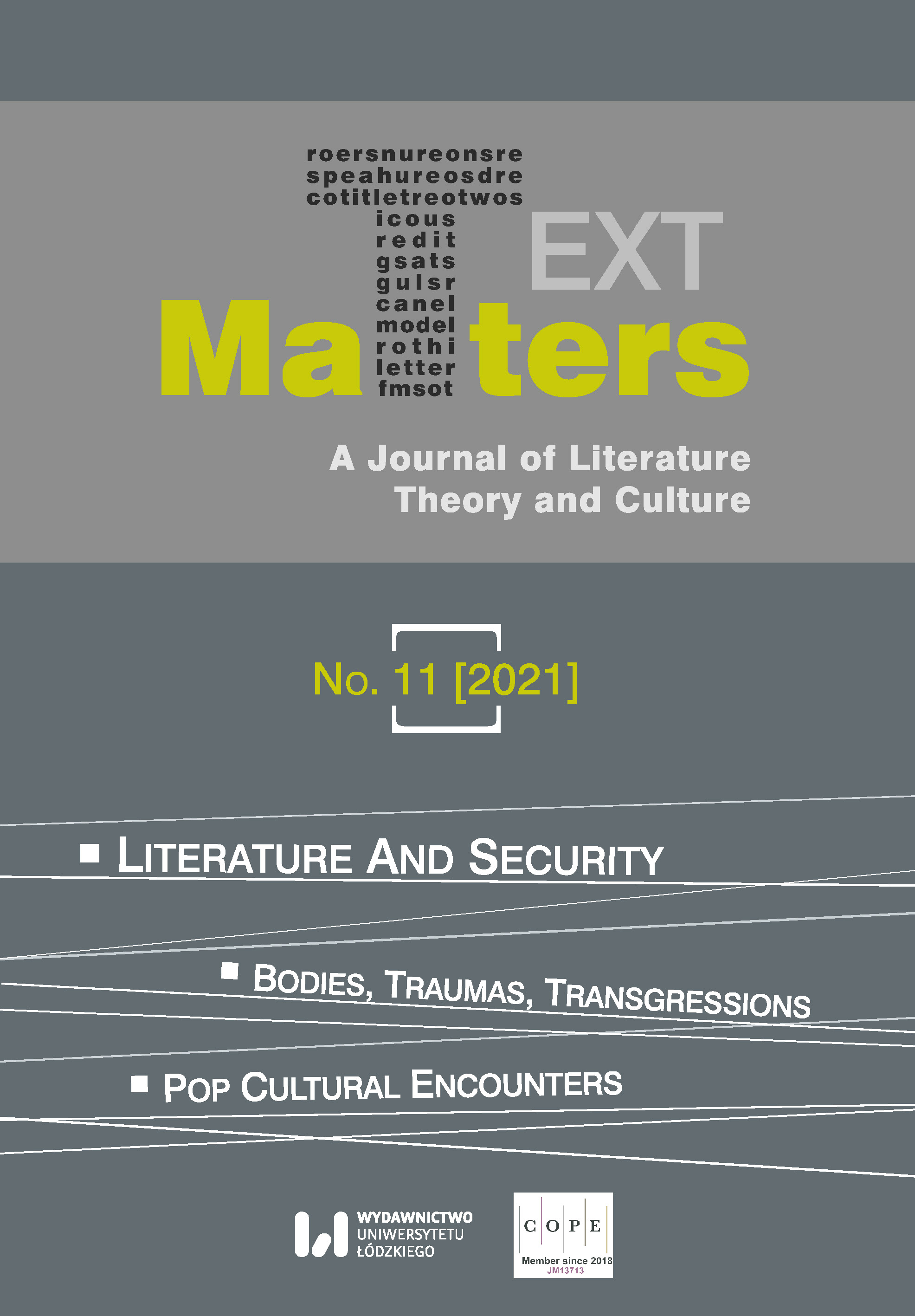Narrative, Insecure Equilibrium and the Imperative to Understand: A Hermeneutics of Woundedness
DOI:
https://doi.org/10.18778/2083-2931.11.18Keywords:
hermeneutics, literary narrative, psychoanalysis, trauma, woundednessAbstract
Addressing trauma as a phenomenon which happens on the level of the human psyche and body, this article explores the impact of the interlocking nature of human lingual and bodily being in discovering a fuller possibility of interpreting and understanding woundedness. The non-transparent and problematic character of trauma calls for a hermeneutic investigation in order to gain a far-reaching insight into what happens with us and in us in traumatic experience(s). The imperative to understand the situation of affliction is an unending task which not only relies upon extant understandings but continually pro-vokes new ones. I argue that the process of healing, encompassing the spoken and bodily narrative, does not establish a secure equilibrium, but rather searches for self-restoring, healing energy and commences ever new understandings of what needs to be comprehended and healed. This article offers an examination of trauma as featured in three short stories by British authors: Rudyard Kipling, D. H. Lawrence and James Joyce, to exemplify the possibilities of literature to shed light on the intricate nature of traumatic experience. It interrogates the ways in which literature, hermeneutics and psychoanalysis meaningfully converge.
Downloads
References
Becket, Fiona. The Complete Critical Guide to D. H. Lawrence. Routledge, 2005. https://doi.org/10.4324/9780203994566
Google Scholar
DOI: https://doi.org/10.4324/9780203994566
Caruth, Cathy, editor. Trauma: Explorations in Memory. John Hopkins UP, 1995.
Google Scholar
Caruth, Cathy. “Trauma, Silence, Survival.” Acts of Narrative, edited by Carol Jacobs and Henry Sussman, Stanford UP, 2003, pp. 47–61.
Google Scholar
DOI: https://doi.org/10.1515/9781503620537-005
Caruth, Cathy. Unclaimed Experience: Trauma, Narrative and History. John Hopkins UP, 2016.
Google Scholar
Cixous, Hélène. The Exile of James Joyce. John Calder, 1976.
Google Scholar
Cowan, James C. D. H. Lawrence: Self and Sexuality. Ohio State UP, 2002.
Google Scholar
Davey, Nicholas. “Lived Experience. Erlebnis and Erfahrung.” The Blackwell Companion to Hermeneutics, edited by Chris Lawn and Niall Keane, John Wiley & Sons, 2016, pp. 326–41. https://doi.org/10.1002/9781118529812.ch38
Google Scholar
DOI: https://doi.org/10.1002/9781118529812.ch38
Denborough, David. Trauma: Narrative Responses to Traumatic Experience. Dulwich Centre, 2006.
Google Scholar
Einhaus, Ann-Marie. The Short Story and the First World War. Cambridge UP, 2013. https://doi.org/10.1017/CBO9781139814898
Google Scholar
DOI: https://doi.org/10.1017/CBO9781139814898
Freud, Sigmund. “The Uncanny.” The Standard Edition of the Complete Psychological Works of Sigmund Freud, Volume 17, translated and edited by James Strachey, in collaboration with Anna Freud, assisted by Alix Strachey and Alan Tyson, Vintage, 2001, pp. 217–56.
Google Scholar
Gadamer, Hans-Georg. “Boundaries of Language.” Language and Linguisticality in Gadamer’s Hermeneutics, edited by Lawrence Kennedy Schmidt, Lexington, 2000, pp. 9–17.
Google Scholar
García-Rivera, Alejandro R. A Wounded Innocence: Sketches for a Theology of Art. The Liturgical, 2003.
Google Scholar
Hołda, Małgorzata. “The Hermeneutics of Conversation; Silence, Epiphany, and the Irreducibility of Conversion.” Roczniki Humanistyczne, vol. LVI, 2016, pp. 157–68. https://doi.org/10.18290/rh.2016.64.11-10
Google Scholar
DOI: https://doi.org/10.18290/rh.2016.64.11-10
Joyce, James. The Dead. Coyote Canyon, 2008.
Google Scholar
Kearney, Richard. “Healing Touch: Hermeneutics of Trauma and Recovery.” Journal of Applied Hermeneutics, 2020, pp. 1–13.
Google Scholar
Kearney, Richard. Imagination Now. Rowman and Littlefield, 2019.
Google Scholar
Kearney, Richard, and Brian Treanor, editors. Carnal Hermeneutics. Fordham UP, 2015. https://doi.org/10.5422/fordham/9780823265886.001.0001
Google Scholar
DOI: https://doi.org/10.5422/fordham/9780823265886.001.0001
Keshavarz, Emon. “D. H. Lawrence: ‘The Blind Man’ and the Untranslatable War.” The Modernist Review, https://modernistreviewcouk.wordpress.com/2019/07/30/d-h-lawrence-the-blind-man-and-the-untranslatable-war/ accessed 26 Dec. 2020.
Google Scholar
Kipling, Rudyard. “The Gardener.” The Heritage of the Great War, https://greatwar.nl/books/gardener/gardener.html accessed 20 Dec. 2020.
Google Scholar
Laub, Doris. “Truth and Testimony: The Process and the Struggle.” Trauma: Explorations in Memory, edited by Cathy Caruth, John Hopkins UP, 1995, pp. 61–75.
Google Scholar
Lawn, Chris. Gadamer: A Guide for the Perplexed. Continuum, 2006.
Google Scholar
Lawrence, D. H. “The Blind Man.” The Literature Network, http://www.online-literature.com/dh_lawrence/england-my-england/3/ accessed 28 Nov. 2020.
Google Scholar
Levine, Peter A., and Ann Frederick. Waking the Tiger: Healing Trauma: The Innate Capacity to Transform Overwhelming Experiences. North Atlantic, 1997.
Google Scholar
Maunder, Andrew. The Facts on File Companion to the British Short Story. Infobase, 2007.
Google Scholar
May, Charles. The Short Story: The Reality of Artifice. Routledge, 2002.
Google Scholar
Orr, Leonard. Joyce, Imperialism and Postcolonialism. Syracuse UP, 2008.
Google Scholar
Ragachewskaya, Marina. Desire for Love: The Secret Longings of the Human Heart in D. H. Lawrence’s Works. Cambridge Scholars, 2012.
Google Scholar
Sassoon, Siegfried. “The Hero.” Poets.org, https://poets.org/poem/hero accessed 4 Dec. 2020.
Google Scholar
Schapiro, Barbara A. D. H. Lawrence and the Paradoxes of Psychic Life. SUNY, 1999.
Google Scholar
Schultze, Cornelia. The Battle of the Sexes in D. H. Lawrence’s Prose, Poetry and Paintings. Universitätsverlag C. Winter, 2001.
Google Scholar
Selingmann, Herbert J. D. H. Lawrence. An American Interpretation. Haskell, 1924.
Google Scholar
Shakespeare, William. The Works of William Shakespeare; Twelfth Night or What you will. Macmillan, 1894.
Google Scholar
The Bible. Official King James Bible Online: Authorized King James Version (KJV), https://www.kingjamesbibleonline.org accessed 20 Dec. 2020.
Google Scholar
“Touch.” Online Etymology Dictionary, https://www.etymonline.com/word/touch accessed 3 Dec. 2020.
Google Scholar
Vickroy, Laurie. Reading Trauma Narratives: The Contemporary Novel and the Psychology of Oppression. U of Virginia P, 2015.
Google Scholar
Wierciński, Andrzej. Existentia Hermeneutica. Understanding as the Mode of Being in the World. LIT Verlag, 2019.
Google Scholar
Wierciński, Andrzej. Hermeneutics of Education. Exploring and Experiencing the Unpredictability of Education. LIT Verlag, 2019.
Google Scholar
Wright, T. R. D. H. Lawrence and the Bible. Cambridge UP, 2000.
Google Scholar
Yalom, Irving. Understanding Group Psychotherapy. U of California Extension, 2000.
Google Scholar
Published
How to Cite
Issue
Section
License

This work is licensed under a Creative Commons Attribution-NonCommercial-NoDerivatives 4.0 International License.













